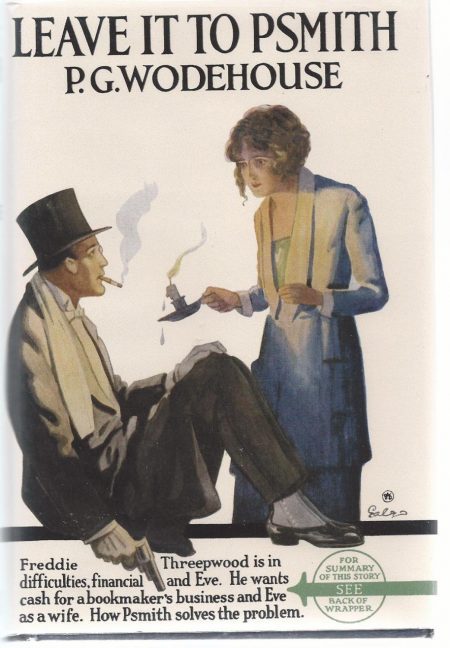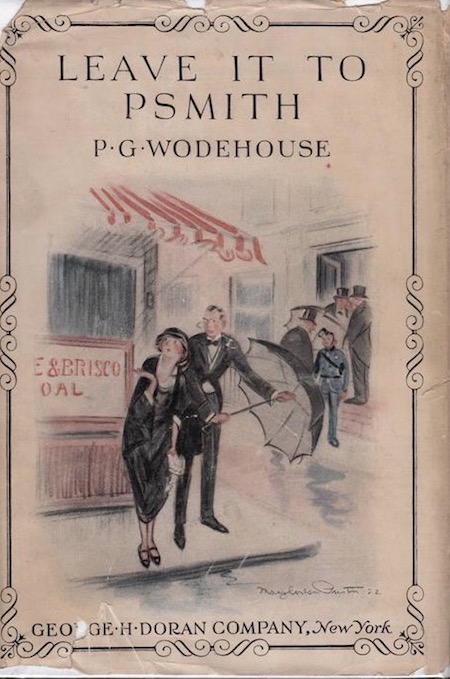LEAVE IT TO PSMITH (10)
By:
March 5, 2019

Leave It to Psmith (1923) is the last and most rewarding of four novels featuring the dandy, wit, and would-be adventurer Ronald Eustace Psmith, one of P.G. Wodehouse‘s most popular characters. (“One can date exactly,” Evelyn Waugh claimed, in reference to Psmith’s debut in the 1909 novel Mike, “the first moment when Wodehouse was touched by the sacred flame.”) Leave It to Psmith‘s copyright enters the public domain in 2019; HiLoBooks is pleased to serialize this terrific book here at HILOBROW. Enjoy!

‘Ah!’ said Psmith tolerantly.
He tucked the umbrella under his arm and went out.
Meanwhile Eve Halliday, lightening up the sombre austerity of Messrs Thorpe & Briscoe’s shop-front, continued to think hard thoughts of the English climate and to inspect the sky in the hope of detecting a spot of blue. She was engaged in this cheerless occupation when at her side a voice spoke.
‘Excuse me!’
A hatless young man was standing beside her, holding an umbrella. He was a striking-looking young man, very tall, very thin, and very well dressed. In his right eye there was a monocle, and through this he looked down at her with a grave friendliness. He said nothing further, but, taking her fingers, clasped them round the handle of the umbrella, which he had obligingly opened, and then with a courteous bow proceeded to dash with long strides across the road, disappearing through the doorway of a gloomy building which, from the number of men who had gone in and out during her vigil, she had set down as a club of some sort.
A good many surprising things had happened to Eve since first she had come to live in London, but nothing quite so surprising as this. For several minutes she stood where she was without moving, staring round-eyed at the building opposite. The episode was, however, apparently ended. The young man did not reappear. He did not even show himself at the window. The club had swallowed him up. And eventually Eve, deciding that this was not the sort of day on which to refuse umbrellas even if they dropped inexplicably from heaven, stepped out from under the awning, laughing helplessly, and started to resume her interrupted journey to Miss Clarkson’s.
The offices of the Ada Clarkson International Employment Bureau (“Promptitude — Courtesy — Intelligence’) are at the top of Shaftesbury Avenue, a little way past the Palace Theatre.
Eve, closing the umbrella, which had prevented even a spot of rain falling on her hat, climbed the short stair leading to the door and tapped on the window marked ‘Enquiries’.
‘Can I see Miss Clarkson?’
‘What name, please?’ responded Enquiries promptly and with intelligent courtesy.
‘Miss Halliday.’
Brief interlude, involving business with speaking-tube.
‘Will you go into the private office, please,” said Enquiries a moment later, in a voice which now added respect to the other advertised qualities, for she had had time to observe and digest the hat.
Eve passed in through the general waiting-room with its magazine-covered table, and tapped at the door beyond marked ‘Private’.
‘Eve, dear!” exclaimed Miss Clarkson the moment she had entered, ‘I don’t know how to tell you, but I have been looking through my books and I have nothing, simply nothing. There is not a single place that you could possibly take. What is to be done?’
‘That’s all right, Clarkie.’
‘But…’
‘I didn’t come to talk business. I came to ask after Cynthia. How is she?’
Miss Clarkson sighed.
‘Poor child, she is still in a dreadful state and no wonder. No news at all from her husband. He has simply deserted her.’
‘Poor darling! Can’t I see her?’
‘Not at present. I have persuaded her to go down to Brighton for a day or two. I think the sea air will pick her up. So much better than mooning about in a London hotel. She is leaving on the eleven o’clock train. I gave her your love, and she was most grateful that you should have remembered your old friendship and be sorry for her in her affliction.’
‘Well, I can write to her. Where is she staying?’
‘I don’t know her Brighton address, but no doubt the Cadogan Hotel would forward letters. I think she would be glad to hear from you, dear.’
Eve looked sadly at the framed testimonials which decorated the wall. She was not often melancholy, but it was such a beast of a day and all her friends seemed to be having such a bad time.
‘Oh, Clarkie,’ she said, ‘what a lot of trouble there is in the world!’
‘Yes, yes,’ sighed Miss Clarkson, a specialist on this subject.
‘All the horses you back finish sixth and all the girls you like best come croppers. Poor little Phyllis! weren’t you sorry for her?’
‘But her husband, surely, is most devoted?’
‘Yes, but she’s frightfully hard up, and you remember how opulent she used to be at school. Of course, it must sound funny hearing me pitying people for having no money. But somehow other people’s hard-upness always seems so much worse than mine. Especially poor old Phyl’s, because she really isn’t fit to stand it. I’ve been used to being absolutely broke all my life. Poor dear father always seemed to be writing an article against time, with creditors scratching earnestly at the door,’ Eve laughed, but her eyes were misty. ‘He was a brick, wasn’t he? I mean, sending me to a first class school like Wayland House when he often hadn’t enough money to buy tobacco, poor angel. I expect he wasn’t always up to time with fees, was he?’
‘Well, my dear, of course I was only an assistant mistress at Wayland House and had nothing to do with the financial side, but I did hear sometimes…’
‘Poor darling father! Do you know, one of my earliest recollections — I couldn’t have been more than ten — is of a ring at the front-door bell and father diving like a seal under the sofa and poking his head out and imploring me in a hoarse voice to hold the fort. I went to the door and found an indignant man with a blue paper. I prattled so prettily and innocently that he not only went away quite contentedly but actually patted me on the head and gave me a penny. And when the door had shut father crawled out from under the sofa and gave me twopence, making threepence in all — a good morning’s work. I bought father a diamond ring with it at a shop down the street, I remember. At least I thought it was a diamond. They may have swindled me, for I was very young.’
‘You have had a hard life, dear.’
‘Yes, but hasn’t it been a lark! I’ve loved every minute of it. Besides, you can’t call me really one of the submerged tenth. Uncle Thomas left me a hundred and fifty pounds a year, and mercifully I’m not allowed to touch the capital. If only there were no hats or safety bets in the world, I would be smugly opulent… But I mustn’t keep you any longer, Clarkie dear. I expect the waiting-room is full of dukes who want cooks and cooks who want dukes, all fidgeting and wondering how much longer you’re going to keep them. Good-bye, darling.’
And, having kissed Miss Clarkson fondly and straightened her hat, which the other’s motherly embrace had disarranged, Eve left the room.
SERIALIZED BY HILOBOOKS: Richard Connell’s “The Most Dangerous Game” | Jack London’s The Scarlet Plague | Rudyard Kipling’s With the Night Mail (and “As Easy as A.B.C.”) | Arthur Conan Doyle’s The Poison Belt | H. Rider Haggard’s When the World Shook | Edward Shanks’ The People of the Ruins | William Hope Hodgson’s The Night Land | J.D. Beresford’s Goslings | E.V. Odle’s The Clockwork Man | Cicely Hamilton’s Theodore Savage | Muriel Jaeger’s The Man With Six Senses | Jack London’s “The Red One” | Philip Francis Nowlan’s Armageddon 2419 A.D. | Homer Eon Flint’s The Devolutionist | W.E.B. DuBois’s “The Comet” | Edgar Rice Burroughs’s The Moon Men | Charlotte Perkins Gilman’s Herland | Sax Rohmer’s “The Zayat Kiss” | Eimar O’Duffy’s King Goshawk and the Birds | Frances Hodgson Burnett’s The Lost Prince | Morley Roberts’s The Fugitives | Helen MacInnes’s The Unconquerable | Geoffrey Household’s Watcher in the Shadows | William Haggard’s The High Wire | Hammond Innes’s Air Bridge | James Branch Cabell’s Jurgen | John Buchan’s “No Man’s Land” | John Russell’s “The Fourth Man” | E.M. Forster’s “The Machine Stops” | John Buchan’s Huntingtower | Arthur Conan Doyle’s When the World Screamed | Victor Bridges’ A Rogue By Compulsion | Jack London’s The Iron Heel | H. De Vere Stacpoole’s The Man Who Lost Himself | P.G. Wodehouse’s Leave It to Psmith.
RADIUM AGE SCIENCE FICTION: “Radium Age” is HILOBROW’s name for the 1904–33 era, which saw the discovery of radioactivity, the revelation that matter itself is constantly in movement — a fitting metaphor for the first decades of the 20th century, during which old scientific, religious, political, and social certainties were shattered. This era also saw the publication of genre-shattering writing by Edgar Rice Burroughs, Sax Rohmer, E.E. “Doc” Smith, Jack London, Arthur Conan Doyle, Aldous Huxley, Olaf Stapledon, Karel Čapek, H.P. Lovecraft, Charlotte Perkins Gilman, Yevgeny Zamyatin, Philip Gordon Wylie, and other pioneers of post-Verne/Wells, pre-Golden Age “science fiction.” More info here.
READ GORGEOUS PAPERBACKS: HiLoBooks has reissued the following 10 obscure but amazing Radium Age science fiction novels in beautiful print editions: Jack London’s The Scarlet Plague, Rudyard Kipling’s With the Night Mail (and “As Easy as A.B.C.”), Arthur Conan Doyle’s The Poison Belt, H. Rider Haggard’s When the World Shook, Edward Shanks’ The People of the Ruins, William Hope Hodgson’s The Night Land, J.D. Beresford’s Goslings, E.V. Odle’s The Clockwork Man, Cicely Hamilton’s Theodore Savage, and Muriel Jaeger’s The Man with Six Senses. For more information, visit the HiLoBooks homepage.
